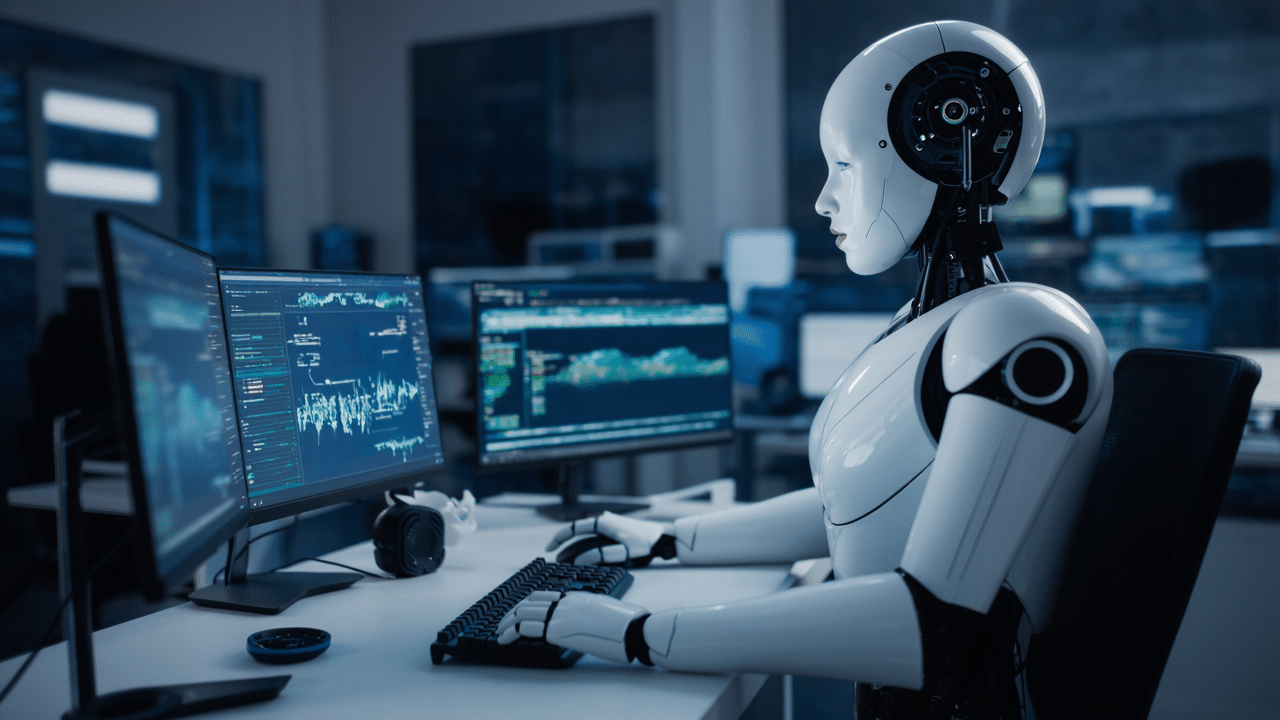Software development is on the brink of a revolution: artificial intelligence (AI) will permanently change and industrialise the processes of this still young industry. While traditional industries such as automotive or manufacturing have long benefited from automation and efficiency gains, software development is lagging behind in terms of standardisation. AI promises to initiate this change by automating up to 80% of coding, taking over repetitive tasks and focusing developers on higher-value, creative activities.
A young industry in transition
Compared to established industries such as steel production or mechanical engineering, software development is a relatively young sector. While the industrial revolution of the 19th century transformed production through mechanisation and later automation, software development remained a labour-intensive discipline for a long time. Developers write code line by line, often customised to specific requirements. However, this way of working is increasingly reaching its limits: the demand for software is growing exponentially – be it for apps, cloud solutions or AI-supported systems – while the availability of qualified developers remains limited. This is where the thesis comes in: AI will industrialise software development by standardising, accelerating and scaling processes.
Automation as a model
A look at traditional industry shows how dramatically automation can increase efficiency. In the automotive industry, for example, over 90% of manufacturing steps are now performed by robots and automated systems (source: International Federation of Robotics, 2023). Standardised components and optimised production lines have reduced costs and increased quality. A similar development is on the horizon for software development. Tools such as GitHub Copilot or DeepCode are already demonstrating how AI can provide code suggestions in real time, detect errors and generate boilerplate code. According to a study by McKinsey (2024), AI-supported development platforms could save up to 30% of development time by 2030 – a first step towards industrialisation.
AI as a game changer: 80% standardisation
The thesis that AI will standardise and take over up to 80% of coding may sound ambitious, but it is supported by current developments. Repetitive tasks such as writing database queries, creating APIs or testing code can already be largely automated. According to a Gartner analysis (2023), half of all new software solutions will be at least partially driven by AI-generated code by 2027. AI will be an indispensable tool particularly in areas such as web development or backend systems, where standard patterns dominate. Companies like Deep Impact AG, which has been active in the AI sector since 2017, are already developing their own applications that drive this trend.
But industrialisation goes beyond pure code generation. AI will also optimise planning and architecture. Tools such as AutoML or AI-supported design frameworks can already suggest software designs based on best practices. This makes not only the implementation, but the entire development cycle more efficient – from requirements analysis to maintenance.
The role of humans
Critics might object that software development is a creative discipline that cannot be fully automated. In fact, AI will not make the role of developers obsolete, but it will change it. While standard tasks are automated, specialists can focus on complex problem solving, innovative architectures and the integration of AI itself. A report by the IEEE (2024) estimates that developers will only spend 20% of their time on pure coding in the future – the rest will be spent on strategy, design and optimisation. This shift towards higher-value activities is reminiscent of the development in the manufacturing industry, where machine operators became engineers and process optimisers.
Challenges and opportunities
Of course, there are hurdles. The quality of AI-generated code has yet to be proven, and safety aspects – for example in critical systems such as medical or aerospace – require human control. In addition, companies need to invest in training their teams to use AI tools effectively. But the opportunities outweigh the risks: scalability, reduced time to market and lower costs will be crucial, especially for business customers. Companies like Deep Impact AG, which have their roots in software development and specialise in AI, are ideally positioned to shape this change.
The industrialisation of software development through AI is not a distant vision, but a transformation that is already underway. Like traditional industry, the software industry will benefit from efficiency, standardisation and automation. Up to 80% of coding could soon be done by AI, freeing developers and making companies more competitive. For Deep Impact AG, this trend offers the opportunity to combine its expertise in AI and software development and to convince business customers with future-oriented solutions.


